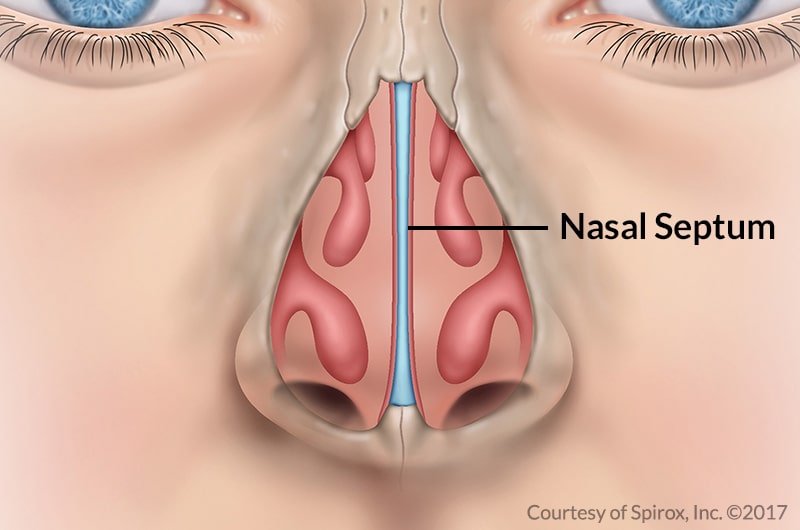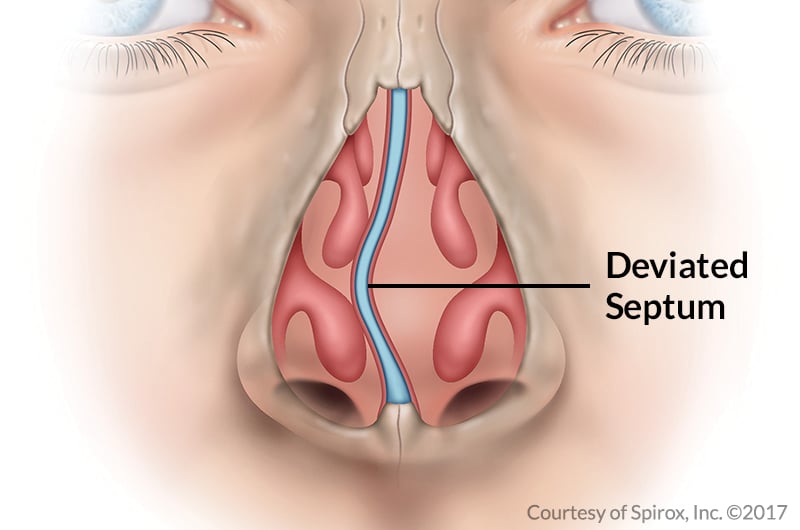
A deviated nasal septum can impact your quality of life by causing breathing difficulties, chronic nasal congestion, and other uncomfortable symptoms.
At Nevada Sinus Relief, Dr. Ashley Sikand, a diplomate of the American Board of Otolaryngology, and his team offer advanced, personalized solutions to treat a deviated septum and restore optimal airflow.


With decades of experience in sinus and nasal conditions, Nevada Sinus Relief provides a transformative solution to help you breathe easier and feel your best.
What Is a Deviated Nasal Septum?
A deviated nasal septum refers to a warp in the nasal septum. The nasal septum is the divider between the right and left sides of the nose. The septum is made of both cartilage and bone. It extends from the center of the front of the nose all the way to the back of the nose. Its purpose is to direct airflow in a smooth (laminar) fashion. Also, it helps to humidify and purify the air we breathe.
A crooked or bent segment of the septum results in the deviation. Usually, the cause of a deviated septum is either hereditary or from trauma. Sometimes, trauma to the nose may occur as a child (for example, a fall as a toddler) or later in life due to sports injuries or a blow to the nose. To diagnose a deviated septum, Dr. Sikand will perform a thorough physical examination and review all symptoms. In addition, an endoscopy may be performed. An endoscope and a bright light are used to open up the nostrils and nasal passages, enabling a thorough visual evaluation.
What Problems Can a Deviated Septum Cause?
Deviation of the nasal septum may cause:
- Difficulty breathing through the nose
- Increased frequency or severity of sinus infections
- Nosebleeds
This condition can also lead to facial pain, headaches, and postnasal drip, which can significantly affect quality of life. In addition, a deviated nasal septum may contribute to obstructive sleep apnea.
Occasionally, septal deviation may trigger or contribute to headaches, also called rhinogenic headaches. Those with only minor displacement may not even be aware of the deviated septum and experience no symptoms at all.
What Treatment Options Are Available for Nasal Septal Deviation?
First, medical treatment is directed at alleviating the symptoms caused by a deviated septum. Therefore, control of allergies or other causes of inflammation with nasal steroid sprays, antihistamines, or decongestants may be needed.
The procedure is highly effective in restoring nasal breathing (about 90%). Furthermore, it is beneficial in decreasing obstructive breathing in sleep apnea patients and decreasing sinus infections. In addition, it can also help control rhinogenic headaches in many patients.

Surgical treatment is indicated for persistent symptoms, and the operation is called a septoplasty. Typically, this surgery takes about thirty minutes. It can be performed in the office or at an outpatient surgery center. Nasal packing is usually not required after surgery. There are no external incisions with this procedure. In most cases, recovery takes 1-2 days.
FAQs

- Chronic nasal congestion
- Difficulty breathing
- Frequent sinus infections
- Nosebleeds
- Sleep disturbances
- The worsening of conditions such as sleep apnea
If you struggle with any of these issues, schedule a consultation with Dr. Sikand. He will let you know which treatment options are the best fit.
In some cases, there can be a genetic predisposition to developing a deviated septum. If you have family members with this condition, you may be more likely to experience it yourself.
This issue can also be caused by injuries or trauma to the nose. This includes injuries or trauma in utero or during the birthing process.
A deviated septum can contribute to ear problems. For example, the abnormal airflow can lead to Eustachian tube dysfunction, causing:
- Increased ear pressure
- Pain and discomfort
- An increased risk of ear infections
Addressing the deviated septum can help alleviate and prevent these issues.
A deviated septum can block the nasal passages. This blockage may lead to poor sinus drainage. It also creates an environment where bacteria and viruses can thrive, increasing the likelihood of recurrent sinus infections.

Most patients experience the following:
- Better breathing
- Reduced nasal congestion
- Fewer sinus infections
Success rates can vary. However, the procedure is generally effective in enhancing overall nasal function.
Preparing for a septoplasty surgery involves several essential steps:
- Attending a Consultation: Meet with Dr. Sikand to discuss the procedure, review your medical history, and undergo a physical examination.
- Receiving Pre-Surgery Instructions: Follow Dr. Sikand's instructions, which may include stopping certain medications, fasting, and avoiding smoking.
- Arranging Transportation: Since septoplasty is usually an outpatient procedure, arrange for someone to drive you home afterward.
- Preparing for Recovery: Prepare your home for recovery with necessary supplies, such as gauze, saline nasal spray, and comfortable resting areas.
Contact Nevada Sinus Relief in Las Vegas, NV, for personalized advice and detailed instructions.
During the recovery period after septoplasty, you can expect some swelling, bruising, and mild discomfort. Most patients notice a significant improvement in symptoms within a few weeks.
To expedite the healing process, it's important to:
- Follow post-operative care instructions
- Avoid strenuous activities
- Attend follow-up appointments to ensure proper healing
Yes, a deviated septum can impact your sense of smell and taste.
When the nasal passages are obstructed, airflow is reduced. This can hinder the olfactory (smell) receptors from detecting scents.
Because a strong link exists between taste and smell, a reduction in smell often leads to a diminished sense of taste as well. In severe cases, corrective surgery can help restore these senses by improving nasal airflow and function.
A deviated septum and nasal polyps are distinct conditions. However, they both can obstruct the nasal passages.
A deviated septum is a structural issue where the cartilage dividing the nostrils is off-center. This leads to breathing challenges and other symptoms.
Nasal polyps, on the other hand, are soft, non-cancerous growths. They develop on the lining of the nasal passages or sinuses as a result of inflammation and are often related to allergies or infections.
Yes, snoring is a common symptom of a deviated septum.
When the septum's misalignment narrows the nasal passages, airflow can become restricted. This is especially likely during sleep. Restricted airflow often causes vibration in the tissues of the nasal passages and throat, contributing to snoring.
Other factors like sleep position and weight can also contribute. However, correcting a deviated septum may help reduce or even eliminate snoring for some individuals.
A deviated septum can affect athletes or people with active lifestyles by restricting nasal airflow. This can make breathing during intense activities more challenging.
This limited airflow may also lead to increased mouth breathing, which can reduce endurance and increase fatigue. This occurs because the body may not receive sufficient oxygen through the nasal passages.
Treating a deviated septum can optimize breathing and support better oxygen intake. This, in turn, can enhance performance, recovery, and endurance in physically active individuals.
Healthcare providers may use imaging tests like CT (computed tomography) scans and nasal endoscopy to diagnose a deviated septum.
A CT scan gives physicians detailed cross-sectional images of the nasal structures. This allows for a clear view of the septum and surrounding tissues.
Nasal endoscopy involves the insertion of a thin, flexible tube with a light and camera into the nose. This test offers a close-up view of the nasal passages and septum.
Both tools help accurately assess the severity and impact of the deviation.
Why Choose Nevada Sinus Relief?
When you visit Nevada Sinus Relief for your septoplasty, you will be cared for by Dr. Ashley Sikand and his team. Dr. Sikand is a board-certified otolaryngologist (ear, nose, and throat specialist) and an expert in sinus and nasal disorders. His commitment to individualized and comprehensive treatment plans means you'll get options tailored to your needs.
At Nevada Sinus Relief, we prioritize your comfort and satisfaction. Our team has created a welcoming environment for personal sinus care. We strive to make your experience as pleasant as possible. Dr. Sikand's dedication to patient education and bespoke treatment methods ensures you receive the highest quality support for your deviated nasal septum. Trust Nevada Sinus Relief to provide superior care and guide you toward better health.
Schedule a Deviated Nasal Septum Consultation in Las Vegas
Do you want to learn more about septoplasty or find out if you're a good candidate? Schedule a consultation today.
Contact Nevada Sinus Relief in Las Vegas, NV, by calling 702.805.1550 or requesting an appointment online. Our highly skilled team is here to help you breathe easier.